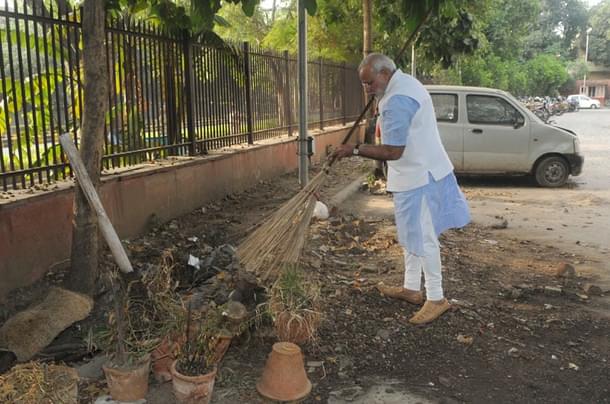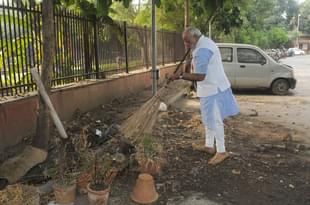Politics
Is 'Swacch Bharat' Possible By 2019?
Arush Tandon
Oct 02, 2015, 02:06 PM | Updated Feb 11, 2016, 09:03 AM IST
Save & read from anywhere!
Bookmark stories for easy access on any device or the Swarajya app.


The answer, very likely, is no. But that is only one of the many things that can be said regarding the ‘Swacch Bharat’ programme as it completes a year.
Looking back at Swacch Bharat one year after it was launched, you realise that it was set up to fail from the very beginning.
Let us start with the reason for Swachh Bharat itself. But before that, a caveat. Since the launch of the initiative, I’ve only had the chance to observe the cities of India. Hence, this piece deals only with them.
Our standard of public hygiene and cleanliness, or the lack of it, is, arguably, the single biggest failure of modern Indian society. The problem is not in any law, or its absence. The problem is our tolerance for filth. If the state of affairs has to be improved, there has to be a behavioural shift in our approach towards hygiene. In other words, public hygiene is a societal problem and it has to be solved by society itself.
(Although herein, we find perhaps the greatest paradox of contemporary Indian life. While everybody is a victim of the lack of public hygiene, not all of them appear willing to do something about it.)
The State, on its part, can do only so much and no more. And that is the first flaw with Swacch Bharat. It has the State trying to solve a problem it never can on its own.
But on second thought, that assessment seems a bit harsh. For, Swacch Bharat was always envisaged as a participatory programme. But here’s the problem. The government can only ensure one-time participation of some people. How does it possibly effect a change in the daily habits of all Indians? This is not like the give-it-up initiative regarding the LPG subsidy. That is a one-time decision for anyone. Cleaning up India and keeping it that way involves a series of small tasks to be performed daily, forming a mundane habit out of them, and eventually turning them into equally mundane rituals of citizenship. Habits and behaviour in turn, are personal. In a country like ours, the State simply cannot operate in that private a sphere.
A totalitarian State would have made the cost of littering unbearably and disproportionately high. Even if we assume that India does something similar, there are simply too many people littering and spitting out there.
The second reason for Swacch Bharat to fail is the time it has been given to succeed. Going by the Prime Minister’s speeches, the programme aims to create a clean India by 2019 as a tribute to Mahatma Gandhi whose 150th birth anniversary would fall in that year (in any case, Swacch Bharat, like all Modi initiatives, would come up for public and opposition scrutiny in the elections of 2019). Meeting that target would require a revolutionary change in both the lifestyle of Indians as well as in urban governance.
If history is anything to go by, a revolution in India is most likely to end up where it started from. Any significant departure from the status quo is better achieved through gradual, long-drawn-out processes, spreading over generations. India prefers social evolution over revolution. Thus, while it is possible that in a couple of decades from now it will achieve the desired standards of hygiene and cleanliness, getting there in 2019 is impossible. We might have a clean country after all, but Swacch Bharat per se, is likely to fall short of its stated aim.
That does not imply that the programme has been a dismal failure. Thousands of volunteers have come forward and participated in the drive. But, if India needs to be cleaned, then adherence to public hygiene should be a characteristic of an Indian citizen, and not only a pledge of a volunteer.
The larger context
The programme and its trajectory thus far, however, provide us with relevant insights into contemporary Indian politics. For one, it is hard to think of another politician in India whose speeches on a subject as boring and preachy as cleanliness would be taken seriously and reacted to. If you think about it, Swacch Bharat is social reform packaged as a government programme. That it has not been rejected as moral sermonising but is instead seeing participation of enthusiastic private citizens, says something about the popularity PM Modi commands today.
Secondly, this initiative helps in preserving and furthering his outsider-in-government image. One of the advantages he had in the Lok Sabha campaign of 2014 was his image of an outsider seeking to replace a rotten aristocracy, so to speak. Now, when as PM, Narendra Modi talks of cleaning the streets of India, and takes up a broom himself, it adds to that. People who supported the outsider-to-the-system in 2014, see an unchanged man, one who continues to raise issues which affect them the most, as far as Swacch Bharat is concerned.

Swacch by when?
So what lies for ahead for Swacch Bharat? A more useful question to ask might be that by when, if at all, will India be swachh (clean) to satisfaction?
On my part, I can’t say when, but I’m certain that ultimately India will attain the standard of cleanliness we desire. In that, what I’ll be very interested in seeing would be that apart from deriving personal utility from a clean country, what would bring in more people to the cause—patriotism for India or a sense of one’s city being in competition with others?
After caste, religion, state and ideology, the next field to throw up popular leaders in India is likely to be the mega-city. In that, waste collection and management will certainly be an important factor in how the local government or representative is judged by the people.
The stated task of Swachh Bharat is too hard to be done by Gandhi’s 150th birth anniversary. That it’ll be completed by then is wishful thinking. However, don’t tell that to the person next to you. If we have to clean India, we could do with a bit of urgency.
Arush Tandon is interested in icons of history, history of independent India and, Indian culture.





